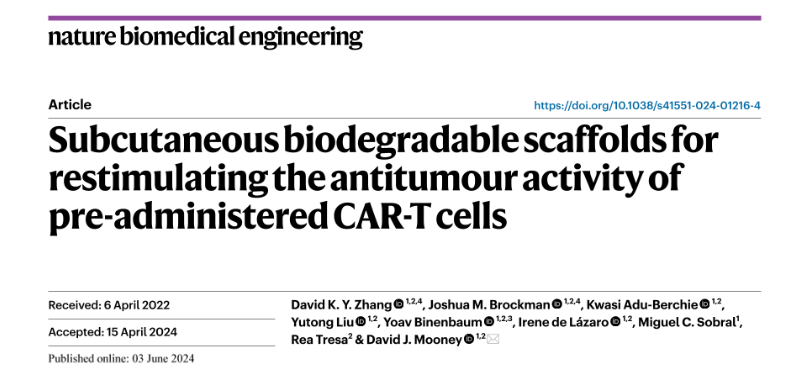Yan Leyfman, Co-founder and Executive Director of MedNews Week shared a post on LinkedIn by Francisco Conesa Buendía, adding:
“An innovative approach from Harvard Medical School to promote CAR T cell longevity and boost therapeutic efficacy through the development and employment of biodegradable scaffolds.”
Quoting Francisco Conesa Buendía’s post:
“Innovative Biodegradable Scaffolds to Boost CAR-T Cell Therapy.
A recent study in Nature Biomedical Engineering reveals a groundbreaking approach to supercharge CAR-T cell therapies using biodegradable scaffolds, potentially overcoming some of the biggest limitations in T-cell therapy for cancer. Here’s a closer look at the key highlights:
T-cell Enhancing Scaffolds (TES): Designed with mesoporous silica rods (MSRs), these scaffolds are loaded with the growth factor IL-2 and coated with T-cell activating ligands (anti-CD3 and anti-CD28).
This innovative structure mimics the body’s natural T-cell activation environment, promoting localized CAR-T cell activation, proliferation, and egress from the scaffold over several weeks. The scaffold gradually degrades, creating a controlled release system that sustains CAR-T cell activity.
Enhanced CAR-T Cell Performance: In aggressive lymphoma models, a single TES injection post-CAR-T cell therapy led to remarkable improvements:
- 5x Higher Circulating CAR-T Cell Concentration
- Memory-Like T-cell Persistence: CAR-T cells in TES-treated animals showed a shift towards memory-like phenotypes, with increased CD45RA+CCR7- effector T cells, vital for prolonged anti-tumor responses.
- Extended Survival: TES-treated animals had significantly prolonged survival, especially when TES included both surface-bound ligands (anti-CD3 and anti-CD28) and IL-2.
Therapeutic Potential: TES could address some major CAR-T cell therapy challenges, such as low T-cell persistence, exhaustion, and poor proliferation in patients with high tumor burden. This strategy may reduce the need for frequent re-injections or extensive genetic modifications, instead allowing the scaffolds to function as localized hubs for continuous CAR-T cell restimulation.
Clinical Implications: With promising preclinical results, TES could make CAR-T cell therapies more effective and accessible, particularly for patients with suboptimal responses to standard treatments. By localizing T-cell activation, TES also potentially mitigates systemic side effects, offering a safer, controlled boost to CAR-T cell efficacy.
This technology exemplifies the potential of biomaterials in advancing cell therapies. With further development, TES could represent a new frontier in cancer immunotherapy.”
Authors: David Zhang, Joshua Brockman, Kwasi Adu-Berchie, Yutong Liu, Yoav Binenbaum, Irene de Lázaro, Miguel Sobral, Rea Tresa and David Mooney.

More posts featuring Yan Leyfman.
Yan Leyfman MD, is the Co-founder and executive director of MedNews Week. He is also the medical correspondent at OncLive. He is also the Executive Committee Member at Music Beats Cancer. He is a Clinical Researcher at Icahn School of Medicine at Mount Sinai. His research interests include oncology, Immunooncology, Cellular Therapy, and Immunotherapy.”


